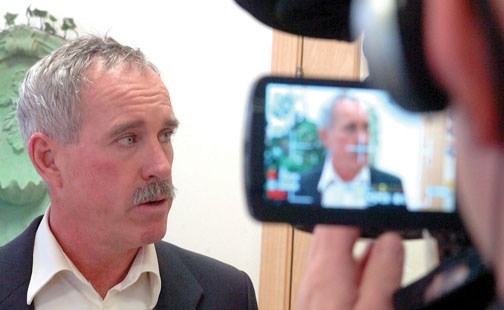With a positive environmental assessment panel recommendation in his back pocket, Northern Gateway president John Carruthers is eager to sit down with provincial government officials as soon as possible.
"I don't see any advantage in waiting," Carruthers said Friday in an interview with the Citizen a day after the report was release. "The Joint Review Panel report is out and that's the most rigorous, science-based, part of the project approval process, so I think there's certainly sufficient information to have that discussion with the province of B.C. now."
While the panel was reporting to the federal government, it's the provincial government which has raised the more vocal concerns about the proposal to ship oilsands products from Alberta to B.C.'s north coast. The B.C. Liberals are sticking to their five environmental, economic and social conditions they say must be met before the pipeline can be considered.
The province and Northern Gateway have yet to sit down, however, to discuss the issue about how to make land and marine spill response world class, how to ensure First Nations are properly consulted and how B.C. can get its fair share economically.
Carruthers believes the panel report can be a jumping-off point for discussions between the company and the province.
"I think there's some recognition by the Joint Review Panel of what's been accomplished, but I think the main thing is we just sit down with British Columbia and say, 'what else has to be done to make this world class,' " he said.
No talks are planned between the two sides, but Carruthers hopes they will take place before the federal government announces its decision within the next 180 days.
"It could assist the federal government as well if there was agreement between the province of B.C. and Northern Gateway that those standards have been met, I think it's just positive for everybody if we look at those," he said. "I think we could align ourselves if we could just start talking."
In addition to talking with B.C. government officials, Carruthers said Northern Gateway also wants to reach out to First Nations communities along the right of way to have further discussions.
Many aboriginal groups are opposed to the pipeline, including the Carrier Sekani Tribal Council which boycotted the Joint Review Panel process and have threatened legal action if the pipeline gets final approval.
Carruthers hopes further discussions with First Nations can ease some of the concerns they have about the pipeline and raise their confidence that it can be built and operated safely.
"Part of it is an education on both sides, we need to listen carefully to what their concerns are and we try to provide information on where we're at today and then we can jointly discuss what else could be done to address their concerns," Carruthers said.
Northern Gateway is still going over the details of the panel's report and the possible impact of the 209 conditions it included in its recommendation. Carruthers said for the most part the findings were consistent with what the company expected.
He anticipates if the federal government were to approve the project, all of those conditions would remain in place so the company will start to look at what work it can begin to do now to meet some of the requirements set out by the panel.
"Some may have a time element where you don't want do them too early, and some may provide information that would be useful in our dialogue with the province of B.C. or First Nations, so you might start some of those," he said.
With the panel report in the company's favour, there are still more hurdles that must be overcome before the project sees the light of day. Not only does the federal government need to sign off on it in the first half of next year, any possible litigation would need to be resolved.
Although the provincial government's blessing isn't a constitutional requirement, it will likely be needed to give the project enough political power to proceed.
Despite the challenges which lie ahead, Carruthers still believes that Northern Gateway will one day be built.
"As a Canadian, I'm very proud of what we were able to accomplish both from a decision-making process and a technology process," he said. "Oil moves around the world safely and Canadians do it better than everyone so I think we'll be able to meet that high standard."



